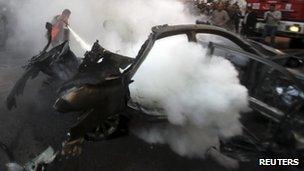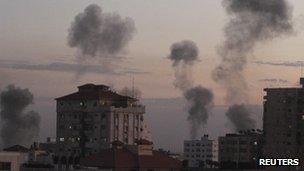What will follow Israel's air strikes on Gaza?
- Published

Israel has warned that more strikes will follow
The warnings from the Israelis were clear. Military action came swiftly and the message from Shin Bet, Israel's general security service, was explicit.
The killing of Ahmed Said Khalil al-Jabari, the head of Izz al-Deen al-Qassam - the military wing of Hamas - is a taste of things to come.
"His elimination," the Shin Bet statement reads, "is a message to Hamas officials in Gaza that if they continue promoting terrorism against Israel, they will be hurt".
This strike has been followed up by a series of air attacks against other targets which an Israeli military spokeswoman described as largely rocket stores and weapons caches. She said this was all part of what she called "a limited operation".
This all follows the recent upsurge in rocket attacks against Israel from the Gaza Strip and the firing of a missile against an Israeli military vehicle patrolling the border fence.
The rocket barrages were met by Israeli air attacks, though some more significant Israeli response was expected.
Only a few days ago, the Israeli press was awash with reports that a large-scale ground operation might be launched into the Gaza Strip, while other commentators speculated on a possible return to the policy of so-called "targeted killings" - precision strikes against the leaders of the military wing of Hamas and other Palestinian groups.
Nonetheless, it had looked as though this flurry of activity was ending and calm was on the way to being restored.
Strategic initiative
But this latest Israeli strike signals the Israeli Prime Minister Benjamin Netanyahu's determination to act; his initial choice, a return to the policy of targeted killings.
This is both a warning to Hamas and an attempt to seize the strategic initiative.
The danger is that it will simply unleash a new cycle of escalation which could eventually prompt a major Israeli engagement on the ground. A general election is due in Israel in late January. That is not in itself what has prompted this Israeli strike.
Israel's existing prime minister, Mr Netanyahu is, for now, the most likely figure to emerge at the head of the next government.
But, as this crisis unfolds, electoral factors could come to influence decision-making.
No Israeli prime minister wants nightly pictures on the television news of the citizens of southern Israel cowering in bomb shelters.
There will be a premium for Mr Netanyahu to act tough and to ensure that Israel emerges with its hand strengthened.
There are big questions here for the Hamas leadership too. Its overall standing has in some ways improved since the upheavals that have buffeted the Arab world.
The Gaza Strip has largely been immune from the popular democratic pressures that have overthrown regimes across the region.
Nonetheless, Hamas now has a more friendly regime to deal with in Egypt and there were signs - with the Emir of Qatar's visit in October - that its diplomatic isolation was slowly ending.
On the military front, though, Hamas has had problems. Maintaining calm is hardly an advert for practising the armed struggle against Israel and it has increasingly found itself "out-bid" by more extreme Islamist groups who launched rockets into Israel.
Confrontation
Indeed, analysts believe that there has been a significant increase in the number of armed jihadist elements in the Gaza Strip, in part a knock-on from the increasing lawlessness in the Sinai Peninsula.
Hamas has thus been in a cleft stick: torn between its unwillingness to lose its resistance credentials, while trying to maintain calm while exercising its governing responsibilities.

There are fears that the strikes will unleash a new cycle of escalation
There must also be questions as to the ability or willingness of Hamas to control other armed factions. Does it actually have the capacity to determine the level of any upsurge of violence?
For their part, the Israelis have now clearly decided that Hamas itself is behind many of the more recent rocket attacks. They say Hamas mortars have fired on Israeli troops clearing explosives near the border fence.
Israel's Defence Minister Ehud Barak has made it clear that Israel hold Hamas - as the de-facto government - responsible for all attacks emanating from the Gaza Strip.
What, though, is the strategic goal behind the decision to strike at the Hamas military leadership? Israel clearly hopes that it can re-establish its deterrence and achieve a longer-lasting ceasefire.
Mr Netanyahu probably wants to avoid a full-scale ground war, like Operation Cast Lead that was launched in December 2008 (also just months ahead of an Israeli general election).
Indeed, neither side may want a full-scale military clash but circumstances could lead them into just such a confrontation.
And there is an added complication too linked to the wider Arab upheavals. The new government in Egypt has warned against any major Israeli incursion into the Gaza Strip.
A new Cast Lead could prompt a dramatic souring of Egypt-Israel ties which are hardly in the best of health anyway.